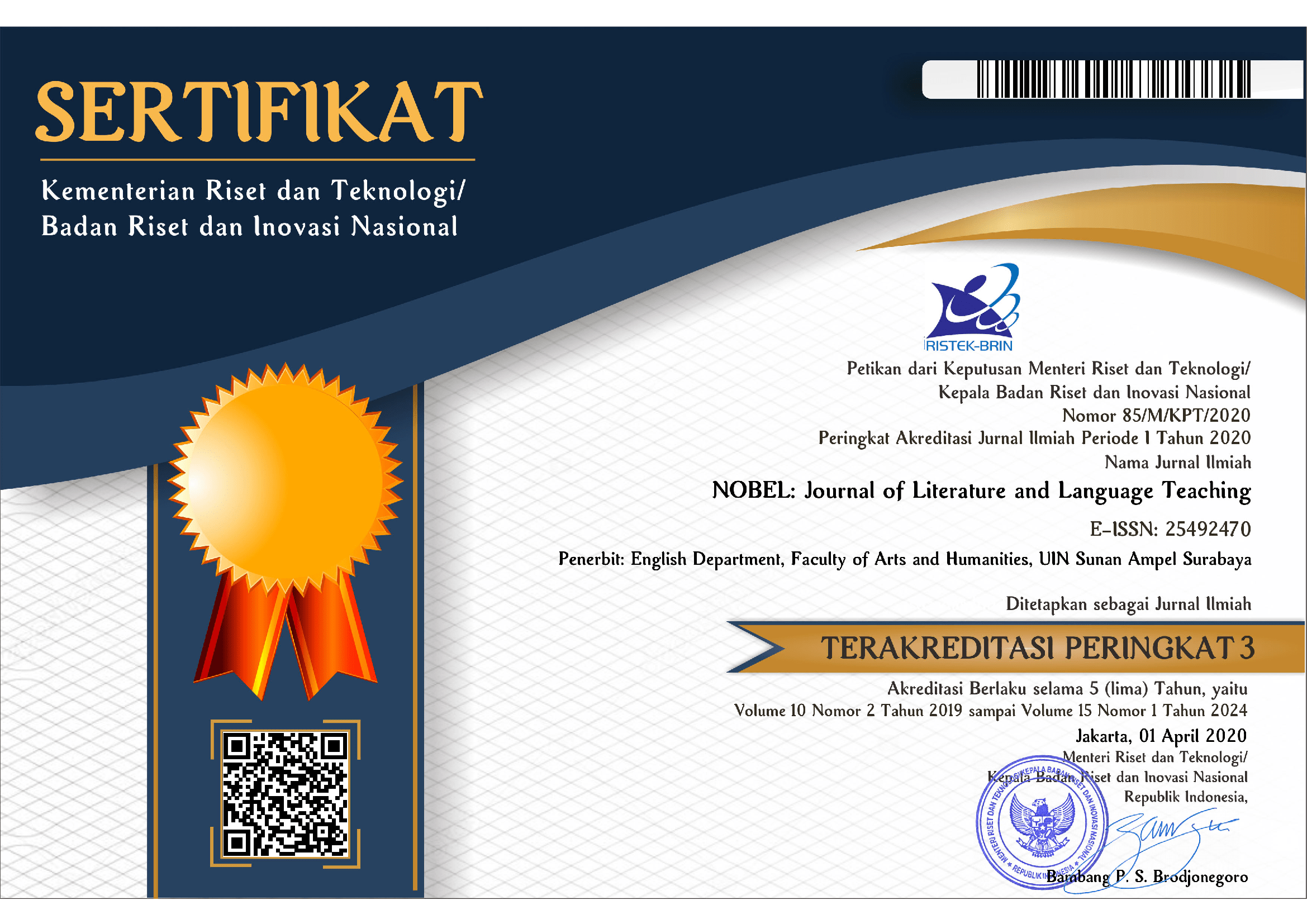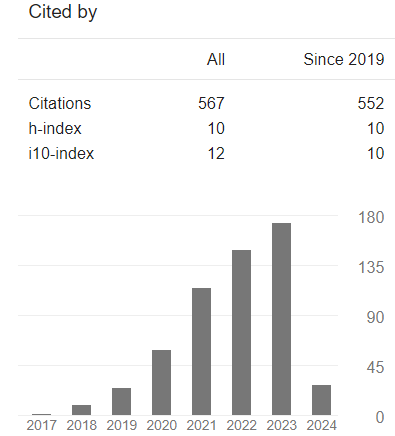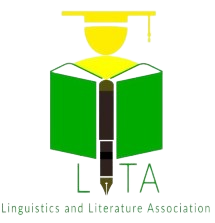Absurdism and Superstitions
Islamic Perspectives in Albert Camus’s The Plague
DOI:
https://doi.org/10.15642/NOBEL.2023.14.1.84-101Keywords:
absurdism, isolation, superstitions, Islamic studies, pandemic literatureAbstract
Many scholars discussing the pandemic issues tend to use Western perspectives. To question this hegemony, this paper investigates Albert Camus’s The Plague (1947) by using Islamic perspectives to challenge the dominant views in evaluating literary canon and pandemic studies. By engaging with postcolonialism and pandemic studies with the frameworks of Islamic studies, this research investigates what differences in pandemic issues are explored in Camus’s novel and how Islam advocates for Muslims to deal with the pandemic problems. The focus of this novel is mainly on European culture and perspectives, although the setting of the novel is Algeria, which is one of the largest Muslim populations in the world. Thus, it is essential to apply the Islamic perspectives in investigating this novel to understand how Islam encourages Muslims to believe and worship God as a way of living instead of being atheists, selfish, and hedonists, as this novel reveals. This research found that the author uses the ideas of absurdism, isolation, and superstitions by depicting the characters as struggling to face the bubonic plague. However, the characters still live in atheism and believe in superstitions instead of worshipping God as Islam advocates.
Downloads
References
Al-Ma’idah: 90. (2022). Quran.Com. https://quran.com/5?startingVerse=90
Ali ’Imran: 18. (2022). Quran.Com. https://quran.com/3?startingVerse=18
An-Nisa: 116. (2022). Quran.Com. https://quran.com/5?startingVerse=116
Baqi, M. F. A. (2017). Al-lu’lu’ wal marjan: Mutiara hadits sahih Bukhari dan Muslim (Tim Penerjemah Aqwam (Ed.)). Ummul Qura.
Bisht, K. (2020). Mental sublimation: The anchor of survival in Albert Camus The Plague. International Journal of Creative Research Thoughts, 8(5), 3039–3041. https://www.academia.edu/download/63474302/IJCRT200539820200530-14190-vtrgcg.pdf
Camus, A. (1947). The plague. Penguin.
Chan-Malik, S. (2018). Being muslim: A cultural history of women of color in American Islam. New York University Press.
Cook, R. (2018). Pandemic. G.P. Putnam’s Sons.
Curtis, E. E. (2009). Muslims in America: A short history. Oxford University Press.
Davis, M. H. (2011). ‘A new world rising’: Albert Camus and the absurdity of neo-liberalism. Social Identities: Journal for the Study of Race, Nation and Culture, 17(2), 225–238. https://doi.org/10.1080/13504630.2011.558375
Fanon, F. (1961). The wretched of the earth. Grove Press.
Foucault, M. (2018). Discipline and punish: The birth of the prison. In V. B. Leitch, W. E. Cain, L. A. Finke, J. McGowan, T. D. Sharpley-Whiting, & J. J. Williams (Eds.), The Norton Anthology of Theory and Criticism (3rd ed., p. 1409). W.W. Norton & Company.
Franco-Paredes, C. (2020). Albert Camus’ The Plague revisited for COVID-19. Clinical Infectious Diseases, 71(15), 898–899. https://doi.org/10.1093/CID/CIAA454
Haber, D. (2019). Intimate strangers: Albert Camus and absurdity in psychoanalysis. Psychoanalysis, Self and Context, 14(4), 349–366. https://doi.org/10.1080/24720038.2018.1557195
Hadith no: 23 narrated/authority of Usama ibn Zayd. (2022). In Imam Malik’s Muwatta. ahadith.co.uk. https://ahadith.co.uk/chapter.php?page=3&cid=95&rows=10
Hadith no: 3170 narrated/authority of Shaddad bin Aws. (2022). In Sunan Ibn Majah. https://ahadith.co.uk/chapter.php?cid=186
Hasan, M. M. (2016). Teaching English literature at IIUM: Islamic perspectives on selected twentieth-century texts. Al-Shajarah, 21(1), 49–71. https://journals.iium.edu.my/shajarah/index.php/shaj/article/download/401/230
Judt, T. (2001, November 29). On “The Plague” . The New York Review of Books. https://www.nybooks.com/articles/2001/11/29/on-the-plague/
Kabel, A., & Phillipson, R. (2021). Structural violence and hope in catastrophic times: from Camus’ The Plague to Covid-19. Race & Class, 62(4), 3–18. https://doi.org/10.1177/0306396820974180
Kelly, J. (2006). The great mortality: An intimate history of the black death, the most devastating plague of all time. Harper Perennial.
Khabeer, S. A. (2017). Africa as tradition in U.S. African American muslim identity. Journal of Africana Religions, 5(1), 26–49. https://doi.org/10.5325/JAFRIRELI.5.1.0026
King, S. (2011). The stand. Anchor.
Lazarus, N. (2011). The postcolonial unconscious. Cambridge University Press.
Peck, J., Theodore, N., & Brenner, N. (2010). Postneoliberalism and its malcontents. In Noel Castree, Paul Chatterton, Nik Heynen, Wendy Larner, & Melissa W. Wright (Eds.), The Point is to Change it: Geographies of Hope and Survival in an Age of Crisis (pp. 94–116). John Wiley & Sons, Ltd. https://doi.org/10.1002/9781444397352.CH5
Peters, M. A. (2020). The Plague: Human resilience and the collective response to catastrophe. Https://Doi.Org/10.1080/00131857.2020.1745921, 54(1), 1–4. https://doi.org/10.1080/00131857.2020.1745921
Peyre, H. (1958). Review: Comment on Camus. The Virginia Quarterly Review, 34(4), 623–629. https://www.jstor.org/stable/26442477
Said, E. (1978). Orientalism. Pantheon Books.
Tuffuor, A. N., & Payne, R. (2017). Isolation and suffering related to serious and terminal illness: Metaphors and lessons from Albert Camus’ novel, The Plague. Journal of Pain and Symptom Management, 54(3), 400–403. https://doi.org/10.1016/j.jpainsymman.2017.07.046
Downloads
Published
How to Cite
Issue
Section
License
Copyright (c) 2023 NOBEL: Journal of Literature and Language Teaching

This work is licensed under a Creative Commons Attribution 4.0 International License.







